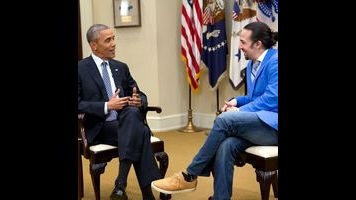Hamilton’s America—directed by Alex Horwitz, a one time roommate of Miranda’s—aims to accomplish a lot. In one sense, it’s about preparing the show that would go onto become a sensation. We see the composer—looking haggard with exhaustion at times—as he furiously writes and performs. It then tackles Alexander Hamilton himself, relying on scholars like Ron Chernow, author of the tome that inspired Miranda, to tell the story of his life from birth to death. You don’t learn much more than what Miranda already included in his lyrics, but you do get to see how he weaved it into something poetic. Along the way Miranda interviews some of his inspirations, sitting down the team of Stephen Sondheim and John Weidman, the men behind Assassins and Pacific Overtures, and the rapper Nas. Cast field trips are also interspersed—it’s particularly amusing to watch Miranda and Leslie Odom Jr., Hamilton and Aaron Burr, visit the Museum of American Finance and handle actual 18th Century dueling pistols. Then, naturally, there’s footage of the Broadway production.
One assumes a lot of people will tune in to see the last thing I mentioned, and they won’t be disappointed. The entire three hour show is not magically condensed into an hour and a half, but the clips come frequently and, though not complete, are fairly extensive. Now—full disclosure—I have seen Hamilton, so I can’t say whether the documentary will satisfy the cravings of those who have simply been devouring the album for months. (I’m also really sorry about this not-so-humble brag.) But I can tell you that the emotional impact of what happens on stage is not diminished. By the end I was sobbing once again mostly thanks to Philippa Soo, who plays Hamilton’s wife Eliza and provides the second act with its most tear-jerking moments.
Hamilton’s America’s many threads frequently feel cut short simply because it’s so vast in scope. An entire movie about Miranda’s creative journey would likely be fascinating: It’s a treat to watch him puzzle over missing portions of yet-to-be-completed songs, and it’s illuminating to see him collaborate with director Thomas Kail and orchestrator Alex Lacamoire. But Horwitz is more interested in hosting a light history lesson with some show business thrown in. If you were surprised to find that Hamilton doesn’t feel like the work of a substitute teacher trying really hard to be cool, you might be wary to learn that Hamilton’s America takes the material back to the classroom. But it does so with aplomb, even if mostly just skims the surfaces of the material. That’s not to say that it glosses over troubling topics entirely: It briefly wrestles with the Founding Fathers’ slaveholding, but ultimately comes to the fairly obvious, if not always acknowledged, conclusion that they were men with both heroic and horrible traits. The sensation of watching the documentary is equivalent to taking a college survey course. It’s high-minded, but you’re going to need to get into the seminar if you want more nuance.
Hamilton’s America is ultimately a celebration of drive, ingenuity, creativity—both on stage and off. At the risk of sounding corny, watching it is a rare opportunity to feel optimistic while wading through the shit of 2016. It recognizes that crap has always been at the foundation of our country, but champions the people who truly make it great.









































